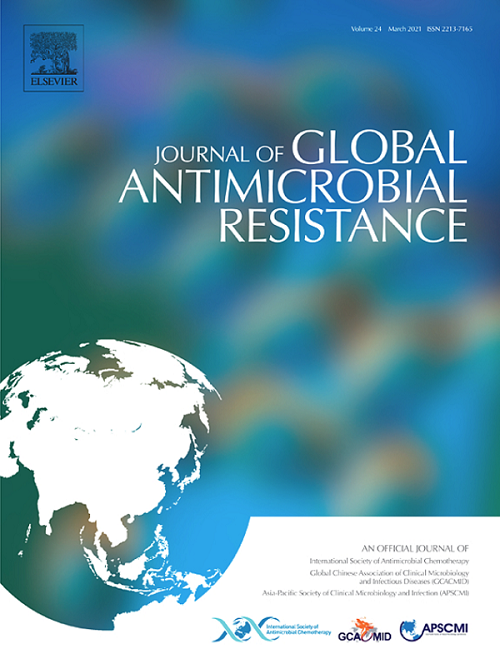Successful use of cefepime/zidebactam in deep-seated infections due to extensively drug-resistant Pseudomonas aeruginosa: A case series
IF 3.2
3区 医学
Q2 INFECTIOUS DISEASES
引用次数: 0
Abstract
Objective
There is a paucity of safe and effective treatment options for extensively drug resistant (XDR) Gram-negative pathogens that often harbor varied resistance mechanisms concurrently. Cefepime/zidebactam (FEP/ZID) is a novel β-lactam/β-lactam enhancer (BL-BLE) combination, currently in Phase 3 trials, that has been shown to be effective against such difficult to treat resistant isolates in-vitro studies and scattered case reports. We present a series of deep seated infections due to XDR Pseudomonas Aeruginosa (PsA), successfully treated with FEP/ZID under compassionate use.
Methods
Between September 2023 and May 2024, using clinico-radiographic and microbiologic (phenotypic drug susceptibility and whole genome sequencing) data, we identified five XDR PsA related infections that could not be safely treated with currently available antibiotics. All patients received FEP/ZID after obtaining informed consent and necessary approvals.
Results
Four cases involved osteoarticular disease while the fifth was an endovascular graft infection. Clinical specimens yielded XDR PsA isolates that harbored varied (enzymatic and non-enzymatic) resistance mechanisms to anti-pseudomonal cephalosporins, carbapenems, aminoglycosides, fluoroquinolones and newer β-lactam/β-lactamase inhibitors. All isolates were susceptible to FEP/ZID and were treated with the same for 2–6 wk. Clinico-radiographic assessments confirmed significant resolution of lesions in all cases. There were with no drug-related adverse events.
Conclusions
The in-vitro susceptibility of our XDR PsA isolates to FEP/ZID translated to a successful clinical outcome in our series of deep-seated infections. FEP/ZID is a potential safe and effective treatment option for such serious Gram-negative infections.
头孢吡肟/齐地巴坦在广泛耐药铜绿假单胞菌引起的深部感染中的成功应用——一个病例系列。
背景:广泛耐药(XDR)革兰氏阴性病原体通常同时具有多种耐药机制,目前缺乏安全有效的治疗方案。头孢吡肟/齐地巴坦(FEP/ZID)是一种新型β-内酰胺/β-内酰胺增强剂(BL-BLE)组合,目前正在进行3期试验,在体外研究和分散的病例报告中已被证明对这种难以治疗的耐药菌株有效。我们报告了一系列由XDR铜绿假单胞菌(PsA)引起的深部感染,在同情使用FEP/ZID的情况下成功治疗。方法:在2023年9月至2024年5月期间,利用临床放射学和微生物学(表型药物敏感性和全基因组测序)数据,我们确定了5例目前可用抗生素无法安全治疗的XDR PsA相关感染。所有患者在获得知情同意和必要的批准后均接受FEP/ZID治疗。结果:4例为骨关节疾病,5例为血管内移植物感染。临床标本中分离出的XDR PsA对抗假单胞菌素、碳青霉烯类、氨基糖苷类、氟喹诺酮类和较新的β-内酰胺/β-内酰胺酶抑制剂具有多种(酶促和非酶促)耐药机制。所有分离株均对FEP/ZID敏感,治疗2 ~ 6周。临床放射学评估证实所有病例的病变明显消退。无药物相关不良事件发生。结论:我们的XDR PsA分离物对FEP/ZID的体外敏感性转化为我们的一系列深层感染的成功临床结果。FEP/ZID是这类严重革兰氏阴性感染的潜在安全有效的治疗选择。
本文章由计算机程序翻译,如有差异,请以英文原文为准。
求助全文
约1分钟内获得全文
求助全文
来源期刊

Journal of global antimicrobial resistance
INFECTIOUS DISEASES-PHARMACOLOGY & PHARMACY
CiteScore
8.70
自引率
2.20%
发文量
285
审稿时长
34 weeks
期刊介绍:
The Journal of Global Antimicrobial Resistance (JGAR) is a quarterly online journal run by an international Editorial Board that focuses on the global spread of antibiotic-resistant microbes.
JGAR is a dedicated journal for all professionals working in research, health care, the environment and animal infection control, aiming to track the resistance threat worldwide and provides a single voice devoted to antimicrobial resistance (AMR).
Featuring peer-reviewed and up to date research articles, reviews, short notes and hot topics JGAR covers the key topics related to antibacterial, antiviral, antifungal and antiparasitic resistance.
 求助内容:
求助内容: 应助结果提醒方式:
应助结果提醒方式:


